1517
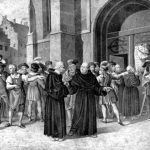
Martin Luther’s 95 theses
On October 31, 1517, Martin Luther published his 95 theses against Indulgences. This was the origin of the schism in the Church, which gave birth to the Reform. Luther’s ideas spread very quickly in Europe and France.
Article : The Lutheran Reformation
1536
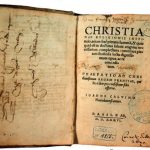
1st edition of The Institutes of the Christian Religion
Calvin published “The Institutes of the Christian Religion” in Latin, preceded by an Address to King Francis I. The work, published in Basel, presents the theological and biblical foundations of the Reform and their consequences. He bases himself on Luther’s theology – justification by faith; salvation through grace – not without assigning it consequences that are often quite different, particularly concerning the organization of Churches, the liturgy, the relationship with the world. Other editions in French followed.
Article : Jean Calvin’s doctrine
1559
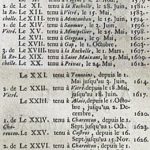
First National Synod of the Reformed Churches
This clandestine meeting of Protestants met in Paris and adopted the first Protestant Confession of Faith in France. Largely inspired by Calvin, this confession of faith was slightly modified to become the La Rochelle Confession of Faith (1571), which remains in our day one of the major texts of the French reform movement.
1562
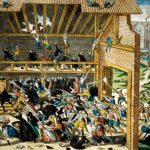
Start of the Wars of Religion, the massacre of Wassy
The massacre, on March 1st, by the Duke de Guise’s troops of some hundred Protestants attending religious services in a barn located inside the ramparts of the city of Wassy (Champagne) and not outside as stipulated by the Edict of January 1562, is considered the event that triggered the first War of Religion.
Article : The massacre of Wassy (1562)
1572
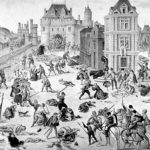
Saint Bartholomew’s Day Massacre
This is the emblematic event of the French Wars of Religion. On August 24, after the marriage of Henry of Navarre (the future Henry IV) and Marguerite de Valois (daughter of Catherine de Medici and sister of the king), most of the Protestant leaders present in Paris at time were assassinated by the Duke de Guise’s party. The situation degenerated into a widespread massacre, even extending outside the capital.
Article : St. Bartholomew’s Day (24th August 1572)
1598
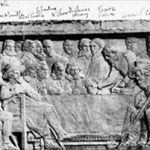
Promulgation of the Edict of Nantes
Having become King of France in 1589, after converting to Catholicism, Henri IV put an end to the Wars of Religion on April 3, 1598 by promulgating the Edict of Nantes. This edict establishes civil equality between Protestants and Catholics. The Edict of Nantes allowed the Protestant community to exist, but within the confines of regulations that, in fact, limited the practice of the reformed religion. It was the major act of Henry IV, which brought peace to France after thirty-six years of religious wars.
Article : The Edict of Nantes (1598)
